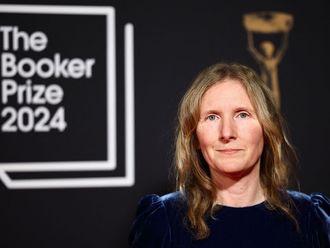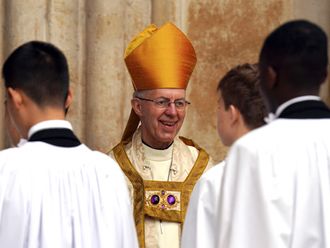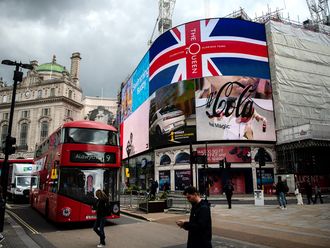London: David Cameron began his holiday on Saturday as the first evidence emerged that his Coalition's honeymoon with the public may be over.
An opinion poll found 57 per cent of people describing its performance as "disappointing" and although there was support for Cameron personally, other ministers have failed to impress. Just 23 per cent of people think Britain is better off with a coalition, with 31 per cent preferring a single party.
As Cameron passes his first 100 days in office today, Daily Telegraph assesses the Prime Minister's performance so far and that of his cabinet ministers, their triumphs and gaffes and the success of the many initiatives they have unveiled.
Made an impressive start by forming the coalition swiftly, then hit the ground running with the Queen's Speech on May 25, which he described as a "radical programme for a radical government".
In it he unveiled 23 Bills with ambitious plans for reform of schools, welfare, the police and the political system. Civil servants point to a more workmanlike, efficient and courteous atmosphere in Downing Street.
The new Prime Minister, they say, has a relaxed, consensual style. His responses to the Saville inquiry on Bloody Sunday and the Cumbria shootings showed leadership and he has presided over a growing Conservative lead in the opinion polls. But he has not always handled his own party effectively and was criticised for attempting to stifle the 1922 committee of backbenchers.
He upset Pakistan by accusing them of "looking both ways" on terrorism, risked a rift with Israel by describing Gaza as a prison camp. He mistakenly suggested that Iran had a nuclear weapon; he also angered war veterans by describing Britain as the US's "junior partner" against the Nazis in 1940.
Despite these early blunders, however, even his critics acknowledge that he is growing in stature on the world stage.
Took his party from third in the polls to being a major force in government. The Deputy Prime Minister began confidently — enjoying a good rapport with Cameron — and was put in charge of the huge area of constitutional reform, a process which he boasted would bring the biggest change to the nation since 1832 — although some see the move as Cameron's way of tying Clegg up and minimising his potential to make trouble. He is also in charge of a major review of "bad law".
Since then he has faltered frequently. He was forced to retreat on plans to make it harder for MPs to dissolve Parliament by imposing a 55 per cent threshold for any vote of confidence.
He now faces a major battle, with Conservative and Labour backbenchers gearing up to join forces to change the date or even scupper the plans altogether. Clegg's standing was not improved when he stood in for Cameron at PMQs last month and called the war in Iraq illegal. He has presided over a massive slump in Lib Dem support and faces internal trouble from his own MPs including party deputy leader Simon Hughes.
Sometimes dismissed as a lightweight in opposition, Osborne has grown in stature now in power. He decisively ushered in the deepest and fastest cuts in public spending in living memory in his emergency Budget.
His zeal to cut the deficit and "balance the books", included a controversial rise in VAT and £40 billion (Dh146.8 billion) extra public spending cuts on top of the £73 billion planned by Alistair Darling. A two year public sector pay freeze; the freezing of child benefit; caps on housing benefit; sweeping changes to how finance is regulated... even Labour MPs admitted it was bold.
However his decision to protect NHS and international development spending is controversial.
The left-leaning Business Secretary often seems the least enthusiastic member of the coalition, and risks earning a reputation as a malcontent. He has privately described the Coalition's immigration cap as "crazy".
He demanded the coalition adopt a controversial graduate tax to fund university education after describing tuition fees as a "poll tax". The plan is now being put to a review, to the dismay of Tory backbenchers who could stage a rebellion if students are forced to pay more than the cost of their degrees in tax.
Cable has, however, proved to be a tough negotiator. Many of the more left wing ideas currently being put in place by the government are testimony to the clout he continues to wield. He refused to back a climb-down on proposed increases in Capital Gains Tax to 40 per cent, for example, so the concessions resulting from a Tory rebellion were limited and a rise to 28 per cent still went ahead. Often seen as the weakest link, and the most likely minister to resign first, he is a force to be reckoned with while he remains in government.
Rejecting the notion that "prison works" and announcing a review aimed at putting fewer criminals behind bars has hardly endeared the Justice Secretary to Conservative MPs.
His proposed prison reforms which would see less emphasis on locking up criminals and more on rehabilitation prompted senior MPs such as Michael Howard and David Davis to speak out against them.
Traditional Tory voters may not like this touchy-feely attitude but it has certainly gone down well with the Lib Dem coalition partners. Many including Davis suspect Clarke's new-found conversion to releasing prisoners is actually an effort to save money quickly and balance the books. He was the first cabinet minister to reach a spending settlement with the Treasury. A wily approach, if true.
The Home Secretary's brief is notorious for ending ministerial careers but Theresa May has already handled plenty of controversies with a cool head.
Her response to the Cumbria shootings won plaudits for being calm and resisting the temptation for a knee-jerk crackdown on guns.
She swiftly overturned Labour measures on data collection and surveillance; abolished ID cards, stopped retention of DNA samples for children; put restrictions on the use of CCTV cameras; scrapped anti-social behaviour orders; and announced the adjournment of the deportation to the USA of alleged computer hacker Gary McKinnon.
May also suspended the controversial criminal vetting scheme for those working with children; abolished police authorities in favour of elected police and crime commissioners and unveiled plans for more civilian reservists.
But her temporary cap on UK visas for non-EU migrants caused a split with the Liberal Democrats who fear its impact on the UK economy.
The Welfare Secretary has evolved from failed party leader to the government's leading authority on social issues and is seen as one of the few champions of the right in the coalition. The self-professed "quiet man" has launched an assault on the benefit culture, proposing tough measures to get the jobless back to work.
Radical schemes unveiled so far include increasing the retirement age to 66; changing Labour's complicated tax credits system, rolling as many as 51 separate benefits into one; and moving half a million families off welfare saving £700 million a year. Others are means-testing child benefit; ending the right of a council house for life; tackling £1.5 billion of benefit fraud. Friends say he would rather resign than see his plans not put into practice, making him another potential breaking point in the coalition.
The Education Secretary made an impressive start, unveiling radical new proposals for free schools popular with many parents.
Promising a common-sense approach, he rebranded his department back to "Education" from "Children, Schools and Families".
However, he then made the most serious mistake of any minister so far, presiding over an embarrassing mix-up over which schools would lose funds for rebuilding and repeatedly issued revised lists of the schools affected which were riddled with errors.
He showed resolve in pushing through the academy bill as a matter of urgency. Despite the speed, however, it seems unlikely that new academies will be formed in time for the autumn term.
William Hague has lived up to the trust Cameron obviously places in him, with a sure-footed performance on the world stage. An early meeting with Hillary Clinton in Washington was followed by a trip to Afghanistan with other ministers. He has outlined plans for a National Security Council and despite being a leading eurosceptic has promised to be pragmatic in relations with Europe. He has spoken of a "new special relationship" with India and oversaw a visit by Cameron there with a large delegation of ministers and business figures. His plans appeal to both Tory Eurosceptics and "internationalist" Liberal Democrats who want to see a break with the Blair era when the US alliance was at the heart of every foreign mission.











